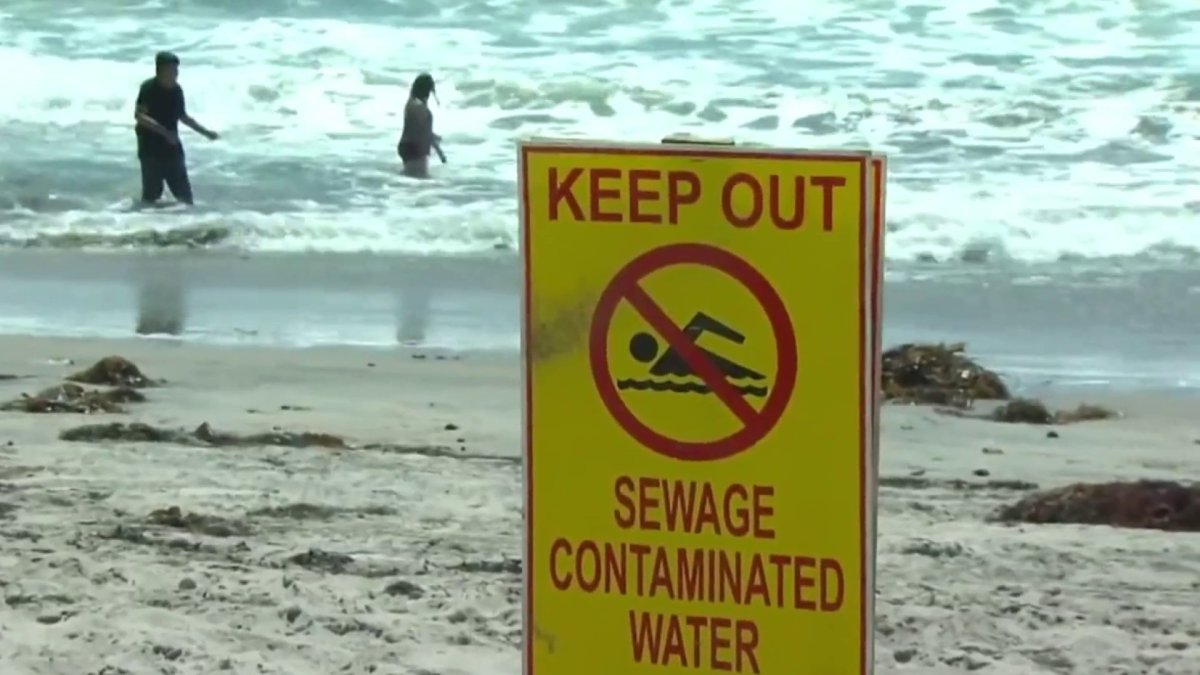
San Diego County is taking similar steps to the city of Flint, Michigan, which also dealt with a water quality crisis. NBC 7’s Jeanette Quezada provides the details.
San Diego County supervisors unanimously approved a proclamation Tuesday declaring a state of emergency due to pollution and sewage flowing across the U.S.-Mexico border.
Board Chairwoman Nora Vargas and Vice Chair Terra Lawson-Remer introduced the proclamation, which asks Gov. Gavin Newsom and President Joe Biden to issue similar declarations, "suspend red tape that may hinder response efforts, and expedite access to federal resources for San Diego County.
"This is the same process recently followed by local agencies to resolve the water quality crisis in Flint, Michigan," county officials added.
Supervisors directed the chief administrative officer to report back within 120 days with a review of economic impacts resulting from U.S.-Mexico border transboundary pollution and pursue available federal and state funding. Lawson-Remer and Vargas represent districts with coastal regions.
Get San Diego local news, weather forecasts, sports and lifestyle stories to your inbox. Sign up for NBC San Diego newsletters.
According to both supervisors, for several decades "the Tijuana River has caused immense devastation to the coastlines and beaches of San Diego County, resulting in contamination and pollution."
Extensive documentation by the U.S. International Boundary and Water Commission has found "that since 2018, more than 100 billion gallons of toxic effluent have entered the United States through the Tijuana River," according to Lawson-Remer and Vargas.
They added that "an alarming 35 billion gallons have crossed the international border flowing north from another broken sewage treatment plant in Punta Bandera" since Dec. 28, 2022, which impacts the San Diego coastline during the summer.
Local
Another consequence of poor water quality is Imperial Beach's south side being closed for over 550 consecutive days due to the persistently poor water quality, Vargas and Lawson-Remer said.
"Today, we're declaring once and for all a state of emergency in the Tijuana River Valley," Vargas said, adding that county beach and baywater data backed the need for a proclamation.
Lawson-Remer said portions of Imperial Beach "have been shuttered every day this year" while sewage flows into coastal areas. "This is absolutely unacceptable," she added.
While the county has spent money to improve stormwater infrastructure, half of the $300 million provided by the federal government will go toward upgrades and deferred maintenance, rather than expanding a wastewater treatment plant, Lawson-Remer said. "We cannot spend years waiting for the fixes to be made — we need action now," she added.
Lawson-Remer said the proclamation will cut through the bureaucracy and will put pressure on the Mexican government to do its part. During public comment, residents including the Imperial Beach mayor, asked the board for the proclamation.
Paloma Aguirre, elected last year to be Imperial Beach's mayor-at- large, said her community cannot wait another 15 years for improvements.
"Imperial Beach has suffered for decades from cross-border pollution, with its beach being closed every day this year ... the impacts are quite, quite severe," she added.
Jack Fisher, a longtime Imperial Beach resident, said his town is now known for beautiful beaches and restaurants, rather than biker gangs and bars, but the water quality situation needs to change.
"It used to be easy to overlook a small southern city in California," he said, "but we know now this beach services the region, which is about 650,000 people, who have not had the opportunity to enjoy the beach, to put their feet in the water."
A woman who identified herself as a lifeguard at Imperial Beach said toxic waste directly affects her and her colleagues' health and safety, as they must perform rescues or dives even with beach closures.
Lifeguards are exposed to serious health risks, including hepatitis or gastrointestinal problems, and that has impacted staffing levels, she said.
"Every day that passes is another 35 million gallons of waste that enters California waters," she added.
Chula Vista resident Alan Curry, who said he lived in Imperial Beach in the 1980s, suggested that focusing on how U.S.-Mexico border commerce is also affected by pollution would result in a stronger proclamation.
One county resident said he opposed the emergency declaration, in part because the treatment plant doesn't work efficiently.